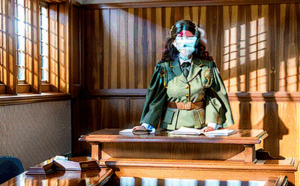A woman with deep ties to a notorious Perth homicide case has been imprisoned after a brutal slashing attack in the city. Shannon Beattie, whose past connection to a convicted killer cast a shadow over her recent trial, received a custodial sentence at Perth Sheriff Court for violently assaulting a male acquaintance with a makeshift weapon.
The incident, which unfolded in the early hours of February 11, 2024, saw Daniel Black sustain severe lacerations to his face and neck. The confrontation erupted after Mr. Black reportedly directed a provocative taunt at Beattie, declaring, “You get people murdered,” a remark that alluded to her history and a tragic event from several years prior.
The weapon used in the assault was described as a homemade implement: a razor blade meticulously embedded into a toothbrush, transforming an everyday item into a dangerous tool. The depth of the facial and neck wound, estimated between five and ten centimetres, was particularly alarming, with Sheriff Jennifer Bain KC later noting that it was “by luck rather than judgement that this was not more serious.”
Beattie’s name first gained public recognition through her involvement as a crucial witness in the trial of Robbie Smullen. Smullen, her former partner, was convicted of culpable homicide in 2019 following the fatal stabbing of 22-year-old Barry Dixon. That tragic event occurred within Beattie’s then-residence in Wallace Court, a residential area within Perth. Smullen, after initially facing a murder charge, was ultimately sentenced to nine years behind bars by an Edinburgh jury. The case, and Smullen’s subsequent repeated bids for parole, have remained significant points of local discussion.
The provocative jibe from Daniel Black clearly struck a nerve with Beattie, triggering the violent altercation at her current home in Tulloch Square, another familiar Perth locality. Despite denying the allegations of the assault and claiming she did not possess the improvised weapon, Beattie was found guilty by a jury after a trial at Perth Sheriff Court.
During the legal proceedings, the court heard compelling evidence regarding the aftermath of the attack. Police Sergeant James Marshall recounted his encounter with Mr. Black shortly after the incident. Despite Mr. Black’s reluctance to provide a formal police statement or testify at the trial, he communicated directly with officers at his nearby home, describing the severity of his injuries and naming Beattie as his assailant. Sgt. Marshall observed Mr. Black to be “agitated,” “upset,” and “crying,” holding a blood-soaked towel to his injured face. The officer detailed Mr. Black’s account of being slashed with an “amended weapon, like a toothbrush with a razor attached,” and his concern that Beattie would attempt to deflect blame onto him by self-inflicting injuries.
Beattie, testifying in her own defence, acknowledged an argument with Mr. Black, attributing it to the distressing comments he made about the Wallace Court tragedy. She told the court her former partner had been imprisoned for “murdering his best friend six years ago,” and that Mr. Black had been “going on about how Robbie had murdered Barry and how I got people murdered.” She vehemently denied owning or using the razor weapon, stating, “I don’t even have a knife block in my house since my ex-partner murdered someone six years ago.” Beattie attempted to suggest that the blood found in her hallway was her own, from a finger injury she vaguely recalled sustaining, though she could not explain its cause.
However, the jury ultimately sided with the prosecution, leading to Beattie’s conviction. During sentencing, Sheriff Jennifer Bain KC delivered a stern rebuke, highlighting Beattie’s extensive and concerning criminal record, which included previous analogous offences involving violence. The Sheriff underscored the perilous nature of the injuries inflicted, emphasizing that the outcome could have been far worse given the proximity of the wounds to vital areas. She concluded that, in light of all circumstances, no alternative to a custodial sentence was appropriate.
As the verdict was delivered, Beattie, reportedly overcome with emotion, wept in the dock. Her defence solicitor, Kirsty Watson, reiterated Beattie’s continued denial of the attack. Ms. Watson informed the court that her client had been grappling with a bereavement at the time of the incident, resorting to drugs and alcohol as a coping mechanism. She also stated that Beattie had been distressed by the comments made to her by Mr. Black and had since made efforts to distance herself from negative influences, acknowledging her past poor choices and striving for self-improvement.
Ultimately, Shannon Beattie was sentenced to 13 months in prison, a sentence that sends a clear message regarding the consequences of violent behaviour, particularly involving dangerous weapons, within the Perth and Kinross community. The case serves as a stark reminder of the long-lasting impact of past traumas and the need for individuals to address their challenges constructively, rather than resorting to violence.
The incident, which unfolded in the early hours of February 11, 2024, saw Daniel Black sustain severe lacerations to his face and neck. The confrontation erupted after Mr. Black reportedly directed a provocative taunt at Beattie, declaring, “You get people murdered,” a remark that alluded to her history and a tragic event from several years prior.
The weapon used in the assault was described as a homemade implement: a razor blade meticulously embedded into a toothbrush, transforming an everyday item into a dangerous tool. The depth of the facial and neck wound, estimated between five and ten centimetres, was particularly alarming, with Sheriff Jennifer Bain KC later noting that it was “by luck rather than judgement that this was not more serious.”
Beattie’s name first gained public recognition through her involvement as a crucial witness in the trial of Robbie Smullen. Smullen, her former partner, was convicted of culpable homicide in 2019 following the fatal stabbing of 22-year-old Barry Dixon. That tragic event occurred within Beattie’s then-residence in Wallace Court, a residential area within Perth. Smullen, after initially facing a murder charge, was ultimately sentenced to nine years behind bars by an Edinburgh jury. The case, and Smullen’s subsequent repeated bids for parole, have remained significant points of local discussion.
The provocative jibe from Daniel Black clearly struck a nerve with Beattie, triggering the violent altercation at her current home in Tulloch Square, another familiar Perth locality. Despite denying the allegations of the assault and claiming she did not possess the improvised weapon, Beattie was found guilty by a jury after a trial at Perth Sheriff Court.
During the legal proceedings, the court heard compelling evidence regarding the aftermath of the attack. Police Sergeant James Marshall recounted his encounter with Mr. Black shortly after the incident. Despite Mr. Black’s reluctance to provide a formal police statement or testify at the trial, he communicated directly with officers at his nearby home, describing the severity of his injuries and naming Beattie as his assailant. Sgt. Marshall observed Mr. Black to be “agitated,” “upset,” and “crying,” holding a blood-soaked towel to his injured face. The officer detailed Mr. Black’s account of being slashed with an “amended weapon, like a toothbrush with a razor attached,” and his concern that Beattie would attempt to deflect blame onto him by self-inflicting injuries.
Beattie, testifying in her own defence, acknowledged an argument with Mr. Black, attributing it to the distressing comments he made about the Wallace Court tragedy. She told the court her former partner had been imprisoned for “murdering his best friend six years ago,” and that Mr. Black had been “going on about how Robbie had murdered Barry and how I got people murdered.” She vehemently denied owning or using the razor weapon, stating, “I don’t even have a knife block in my house since my ex-partner murdered someone six years ago.” Beattie attempted to suggest that the blood found in her hallway was her own, from a finger injury she vaguely recalled sustaining, though she could not explain its cause.
However, the jury ultimately sided with the prosecution, leading to Beattie’s conviction. During sentencing, Sheriff Jennifer Bain KC delivered a stern rebuke, highlighting Beattie’s extensive and concerning criminal record, which included previous analogous offences involving violence. The Sheriff underscored the perilous nature of the injuries inflicted, emphasizing that the outcome could have been far worse given the proximity of the wounds to vital areas. She concluded that, in light of all circumstances, no alternative to a custodial sentence was appropriate.
As the verdict was delivered, Beattie, reportedly overcome with emotion, wept in the dock. Her defence solicitor, Kirsty Watson, reiterated Beattie’s continued denial of the attack. Ms. Watson informed the court that her client had been grappling with a bereavement at the time of the incident, resorting to drugs and alcohol as a coping mechanism. She also stated that Beattie had been distressed by the comments made to her by Mr. Black and had since made efforts to distance herself from negative influences, acknowledging her past poor choices and striving for self-improvement.
Ultimately, Shannon Beattie was sentenced to 13 months in prison, a sentence that sends a clear message regarding the consequences of violent behaviour, particularly involving dangerous weapons, within the Perth and Kinross community. The case serves as a stark reminder of the long-lasting impact of past traumas and the need for individuals to address their challenges constructively, rather than resorting to violence.


